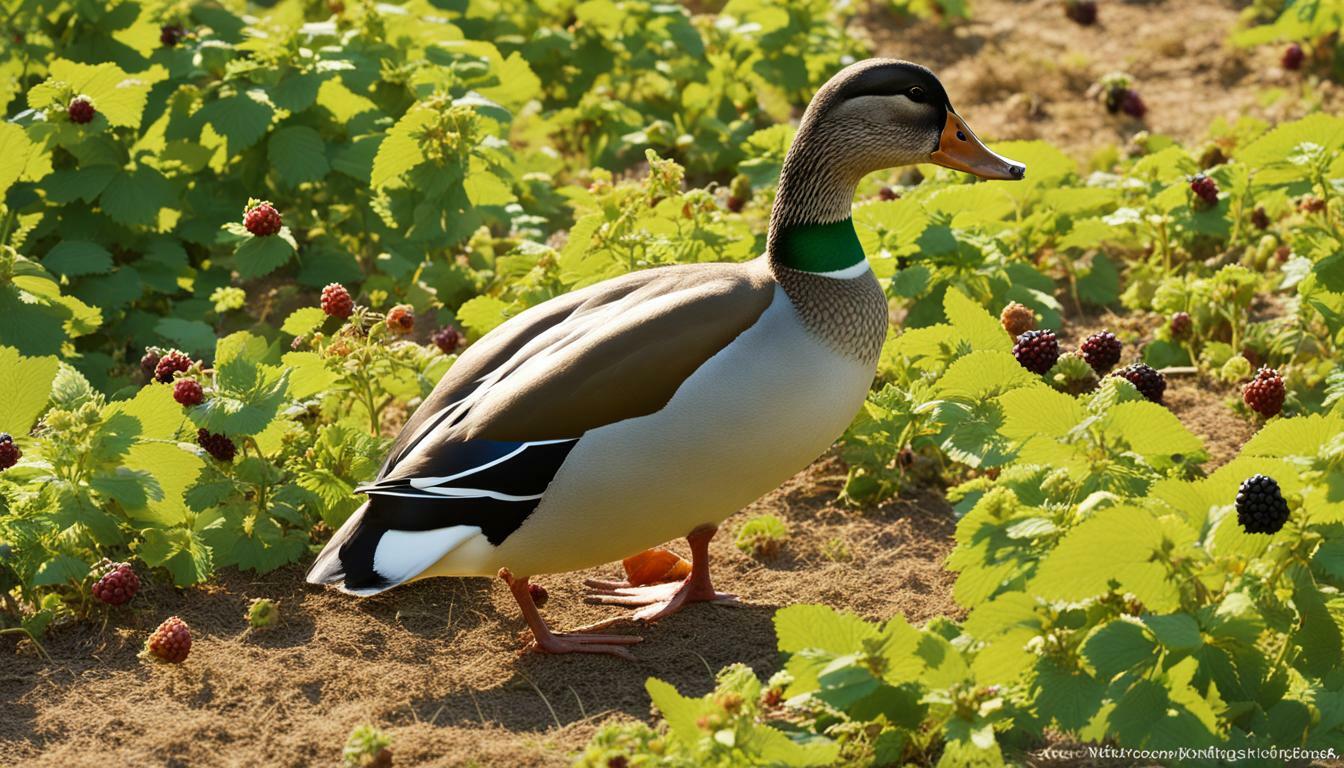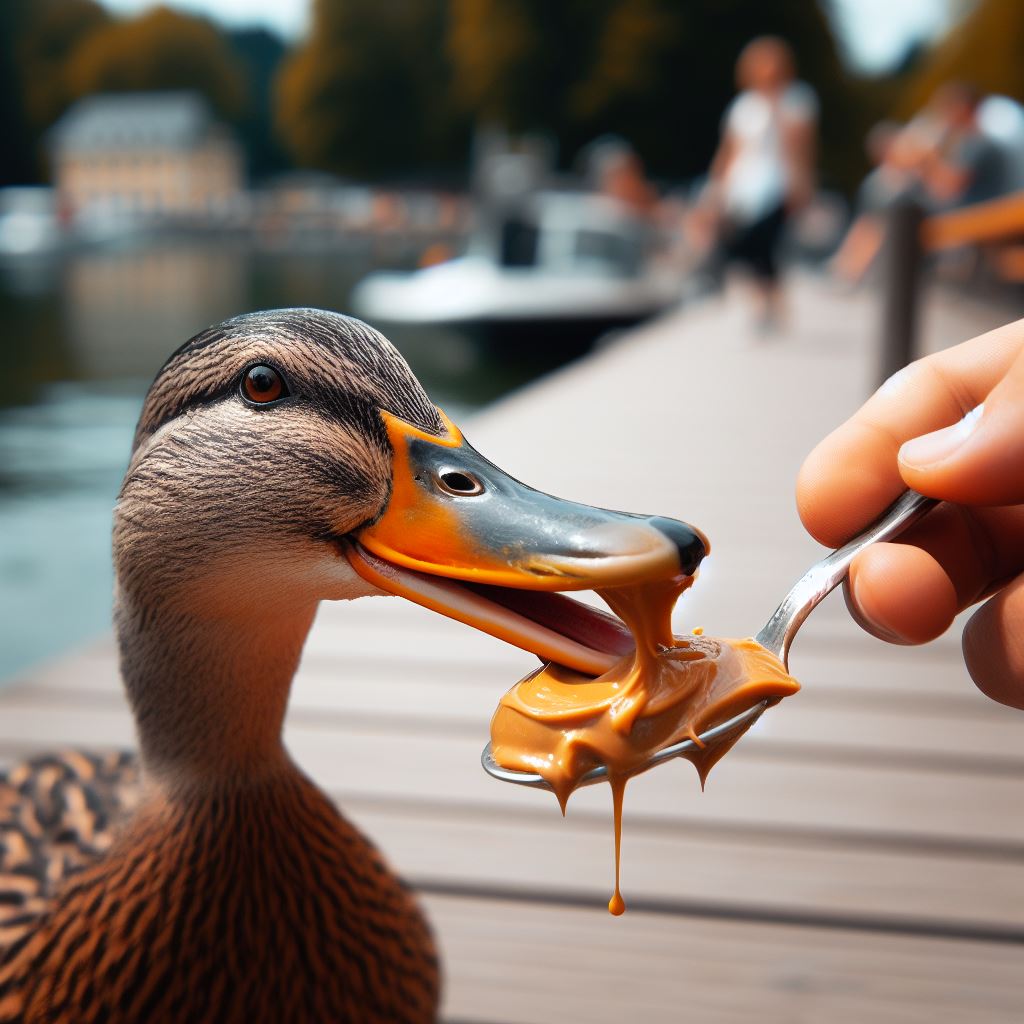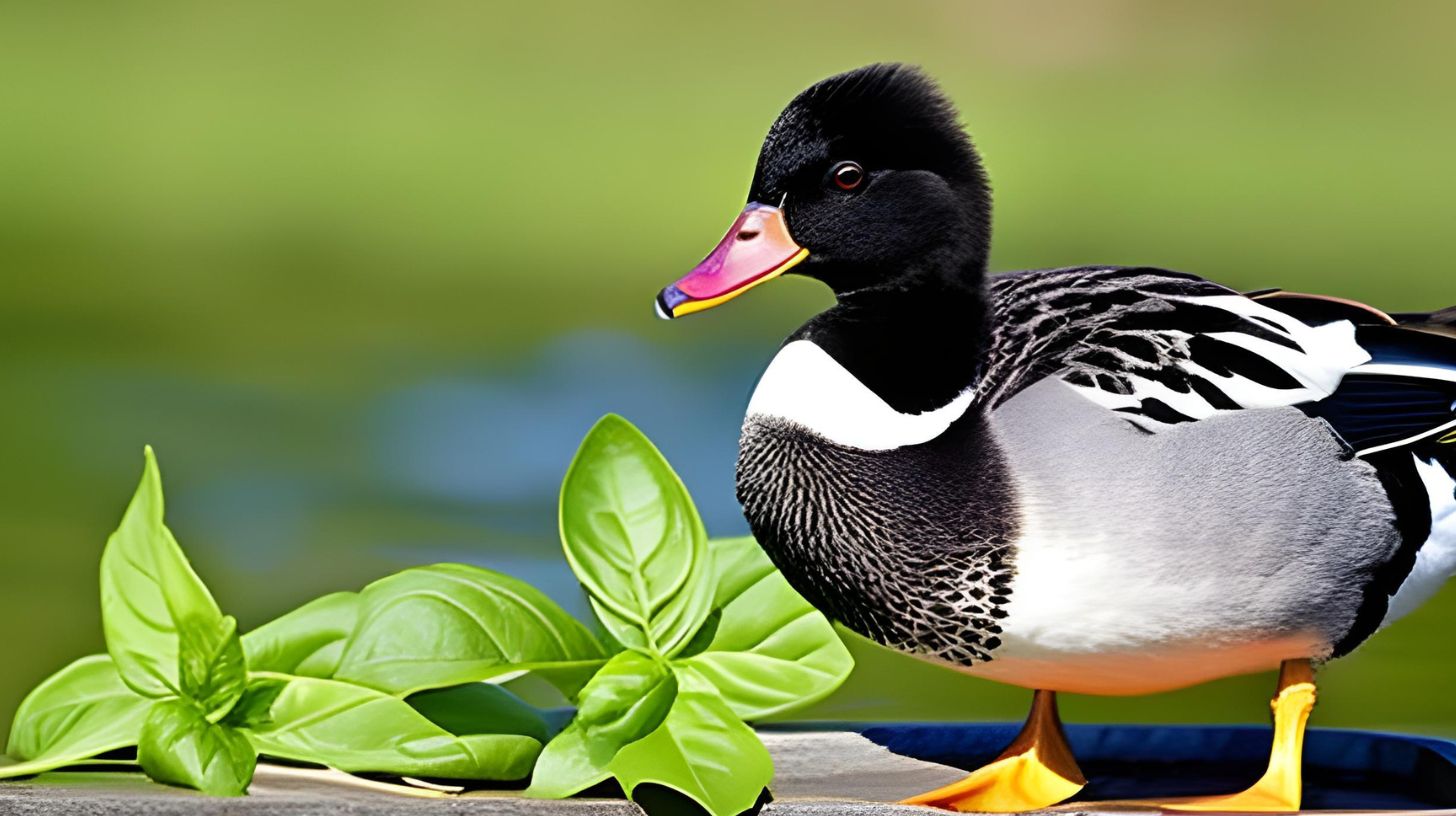Can Ducks Eat Blackberries? Get Your Answer Here!

Table of content:
- How Many Blackberries Can Ducks Eat in One Sitting?
- Are Blackberries Safe for Baby Ducks to Eat?
- What Happens if a Duck Eats Too Many Blackberries?
- Do Wild Ducks Eat Blackberries?
- Should You Feed Blackberries to Ducks?
- Do Blackberries Upset a Duck’s Stomach?
- How Do You Feed Blackberries to Ducks?
- Do Ducks Like the Taste of Blackberries?
- When Do Ducks Start Eating Blackberries?
- Are Thornless Blackberries Safer for Ducks to Eat?
- Final Thoughts
Blackberries are a delicious and nutritious fruit that both humans and animals enjoy. Ducks are no exception. But can ducks eat blackberries safely? How much is too much? And what’s the best way to feed blackberries to ducks? This comprehensive guide will answer all your questions about feeding blackberries to ducks.
How Many Blackberries Can Ducks Eat in One Sitting?
Ducks can safely eat a fair amount of blackberries in one sitting. Adult ducks can eat around 1⁄4 to 1⁄2 cup of blackberries per day as part of a balanced diet. Baby ducks should start with just a few berries at first.
The exact amount of blackberries a duck can eat depends on its size and overall diet. Larger duck breeds like Pekins can handle more blackberries than smaller breeds like Calls.
Monitor your duck as it eats blackberries. If it seems to lose interest after eating 1⁄4 cup, that is likely a good amount for that particular duck. Let it graze on the berries over the course of the day rather than gorging all at once.
Are Blackberries Safe for Baby Ducks to Eat?
Yes, blackberries are safe for ducklings to eat in moderation. Blackberries contain vitamin C, vitamin K, antioxidants, and fiber that ducklings need for healthy growth and development.
Start ducklings off slowly on blackberries. Introduce just a few mashed blackberries into their feed at first. Gradually increase the amount as they get older.
Blackberries should never make up more than 10% of a duckling’s diet. The majority should still come from a balanced duck starter feed. Avoid giving ducklings too many berries at once as it may cause diarrhea.
Rinse blackberries and remove any spoiled or moldy berries before feeding to ducklings. Unwashed produce can expose young ducks to harmful bacteria like salmonella.
What Happens if a Duck Eats Too Many Blackberries?
Eating too many blackberries can cause digestive issues in ducks. Diarrhea, intestinal upset, and loose stool are common side effects of overindulging on blackberries.
The high fiber content of blackberries combined with the natural fruit sugars causes extra fluid to be retained in the digestive tract. This speeds up transit time and results in runny droppings.
In severe cases, eating excessive blackberries could potentially cause intestinal blockages. The seeds and plant fibers may clump together and obstruct the gastrointestinal tract.
If your duck seems lethargic, has a bloody stool, or shows signs of pain after eating lots of berries, contact your vet immediately. Intestinal blockages are serious and require emergency medical care.
Do Wild Ducks Eat Blackberries?
Wild ducks will absolutely eat blackberries whenever they can find them. In late summer and early fall, wild ducks will flock to bushes loaded with ripe, juicy blackberries.
Blackberries provide essential nutrients like vitamin C, vitamin K, magnesium, and copper. They also contain antioxidants that boost the immune system and support overall health.
The fruit helps meet wild ducks’ increased energy demands during molting and migration. The natural sugars offer quick energy while the seeds and pulp provide fill.
Ducks also eat blackberries for hydration. Blackberries have extremely high water content, about 88% by weight. This helps keep ducks hydrated in warmer seasons when water sources may dry up.
Overall, wild ducks relish blackberries as a readily available and nutritious seasonal food source.
Should You Feed Blackberries to Ducks?
Yes, blackberries make a healthy treat and supplement to a balanced duck diet. In small amounts, blackberries provide beneficial nutrients, antioxidants, and fiber.
When feeding blackberries to ducks, moderation is key. Too many can cause diarrhea. Aim to feed no more than 1⁄4 to 1⁄2 cup per day for a normal-sized adult duck.
Make sure all berries are ripe and free of mold. Rinse thoroughly to remove dirt and chemical residues. Mash slightly for young ducklings.
Combine blackberries with duck feed for a complete diet. Never rely solely on fruit. A quality pellet should still form the bulk of a duck’s nutritional intake.
Avoid sudden large amounts of blackberries. Introduce them slowly over a week to allow the duck’s digestion to adjust. This will prevent stomach upset.
Do Blackberries Upset a Duck’s Stomach?
Blackberries have the potential to upset a duck’s stomach if they are fed improperly. The high natural sugar and fiber content of blackberries means they should only be fed in moderation. Too much at once can definitely cause digestive upset.
Signs that blackberries have upset your duck’s stomach include:
- Loose, watery droppings
- Reduced appetite
- Listlessness or lethargy
- Straining to defecate
- Bloody stool
- Feather pulling
To prevent stomach upset, introduce blackberries gradually. Only feed a handful per day along with the duck’s normal food. Rinse off berries and remove any damaged, rotten, or moldy ones that could make the duck sick.
Discontinue blackberries if you notice continued digestive distress. Consult an avian vet if stomach upset persists beyond 24 hours.
How Do You Feed Blackberries to Ducks?
Here are some tips for safely feeding blackberries to ducks:
- Offer ripe, fresh blackberries free of mold, damage, or rot.
- Rinse thoroughly and pat dry to remove dirt, chemicals, and bacteria.
- Mash gently for young ducklings.
- Mix berries into normal feed for balanced nutrition.
- Limit to 1⁄4 – 1⁄2 cup per day maximum for adult ducks.
- Introduce slowly over a week, gradually increasing portion.
- Provide clean water to help digestion and hydration.
- Observe duck’s droppings to ensure no digestive upset.
- Remove uneaten berries within 24 hours to prevent spoilage.
- Store extra berries in the refrigerator for up to 3 days. Wash again before refeeding.
Follow these guidelines for happy ducks and happy tummies when feeding blackberries!
Do Ducks Like the Taste of Blackberries?
Ducks absolutely love the sweet taste of ripe blackberries! In the wild, ducks eagerly flock to bushes full of plump, juicy blackberries once they ripen in mid to late summer.
Domestic ducks show just as much enthusiasm for fresh blackberries. They will eagerly gobble them down.
The sweet yet slightly tart flavor profile of blackberries is very palatable for ducks. Anecdotal reports show hand-fed pet ducks even sometimes delicately pluck blackberries right from a person’s fingers!
So long as they are fed in moderation, blackberries make a wonderful treat and supplemental food for domestic ducks. Their natural sweetness satisfies ducks’ appetite for sugary foods.
The crunchy seeds and juicy flesh add interesting textures that ducks enjoy as well. Just be careful not to let them overindulge, as too many berries at once can cause stomach upset.
When Do Ducks Start Eating Blackberries?
In the wild, ducks will start eating blackberries as soon as they ripen in mid to late summer. The exact timing depends on the climate and location.
Blackberry bushes produce flowers and immature green fruit starting in spring. The berries gradually enlarge and turn glossy black through summer. Once the berries taste sweet, ducks will immediately take advantage of the bounty.
For domestic ducks, you can introduce blackberries once they mature and become readily available in markets and berry patches. This is typically anywhere from July through September in most regions.
Baby ducklings as young as 2-4 weeks old can start enjoying a few mashed blackberries at a time. Just a tiny portion mixed into their feed is plenty.
As juvenile ducks grow, they can handle increased portions of berries. By 16 weeks to 6 months, they can eat the same blackberry amounts as adult ducks.
Are Thornless Blackberries Safer for Ducks to Eat?
Yes, thornless blackberry varieties are safer options if you plan to hand-feed blackberries to your ducks directly. They eliminate the risk of the ducks choking on thorns or scratching their throats.
Thornless blackberries are produced by cultivating varieties that lack the thorn gene. The berries develop smoothly without the thorny stems.
Common thornless blackberry cultivars include:
- Loch Ness
- Black Satin
- Triple Crown
- Chester Thornless
- Navaho
Even if you opt for a thorny blackberry variety, you can still remove any prickles by rinsing and lightly crushing the berries before feeding them. Just take care to inspect thoroughly for any stray thorns.
Any blackberry variety can be fed to ducks. But if you want to hand-feed them directly, thornless blackberries make the experience safer and more pleasant for both you and your ducks.
Final Thoughts
Blackberries are a nutritious fruit full of vitamins, minerals, and antioxidants that ducks enjoy eating. When feeding blackberries to ducks, moderation is key. About 1⁄4 to 1⁄2 cup daily is the recommended amount for most adult ducks. Introduce them slowly and discontinue use if any digestion issues arise. With proper precautions, blackberries make a fun, safe, and healthy supplemental food. Just be careful not to overdo it with these sweet summer berries!
Welcome. I’m Adreena Shanum, the proud owner of this website, and I am incredibly passionate about animals, especially poultry. I founded adreenapets.com as a labor of love, stemming from my desire to share my knowledge and experiences with poultry enthusiasts worldwide.




